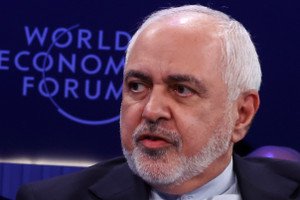Iran tries to calm nuclear concerns as UN warns on enrichment
Published by Global Banking & Finance Review®
Posted on January 22, 2025
4 min readLast updated: January 27, 2026

Published by Global Banking & Finance Review®
Posted on January 22, 2025
4 min readLast updated: January 27, 2026

Iran denies nuclear weapon ambitions, offers talks at Davos as UN warns of increased uranium enrichment. Diplomacy with Trump seen as crucial.
By Samia Nakhoul and Leela de Kretser
DAVOS, Switzerland (Reuters) - Iran delivered a conciliatory message to Western leaders in Davos on Wednesday, with a top official denying it wants nuclear weapons and offering talks about opportunities, days after its arch adversary Donald Trump's return to the White House.
However, the comments by Iran's Vice-President for Strategic Affairs Mohammad Javad Zarif coincided with a warning by the U.N.'s nuclear watchdog that Tehran is "pressing the gas pedal" in enriching uranium to near weapons-grade.
International Atomic Energy Agency (IAEA) chief Rafael Grossi has called for diplomacy between Iran and Trump, who in his first term, pulled the U.S. out of a nuclear deal that had imposed strict limits on Iran's atomic activities.
Asked how crucial the dialogue between Tehran and Trump is right now, Grossi replied in Davos: "Absolutely indispensable."
"Without their dialogue, there's not going to be any progress," he said during a media panel discussion.
U.N. Secretary-General Antonio Guterres, meanwhile, said that Iran must make a first step towards improving relations with countries in the Middle East and the U.S. by making it clear it does not aim to develop nuclear weapons.
Zarif's remarks appeared aimed at calming those worries, amid fears that the Middle East is headed for yet more war with the return of a U.S. president who, during his first administration, cast Tehran as his top foreign policy villain.
'MOVE FORWARD'
Zarif dismissed the idea that Tehran sought nuclear arms, and signalled support for the idea of talks to improve relations between Iran and its critics in the West.
"There's always hope that people will choose rationality. I hope that this time around, a 'Trump 2' will be more serious, more focused, more realistic," Zarif told a panel, adding the Islamic Republic did not pose a security threat to the world.
"Now, for us, is the time to move forward. We have been looking at our surroundings as a threat, because of our history. Now ... Nobody thinks of Iran as such an easy place to carry out their whims. So, we can move forward, based on opportunity, rather than based on threats. So, let's talk about that."
Iranian, Arab and Western officials told Reuters late last year that Iran's main concern is the potential for Trump to push Israel to strike Iran's nuclear sites and reimpose his "maximum pressure policy" through more sanctions on its oil.
Trump stated in an election speech in October his unwillingness to go to war with Iran, but said Israel should "hit the Iranian nuclear first and worry about the rest later", in response to an Iranian missile attack on Israel on Oct. 1.
In 2018, then-President Trump reneged on Tehran's 2015 nuclear deal with world powers and re-imposed harsh U.S. sanctions as part of his "maximum pressure" policy on Iran.
ENRICHMENT
In response, Tehran breached the deal in several ways including by accelerating its uranium enrichment.
Grossi said last month that Iran had informed the IAEA that it would "dramatically" accelerate enrichment of uranium to up to 60% purity, closer to the roughly 90% of weapons grade.
Western powers called the step a serious escalation and said there was no civil justification for enriching to that level and that no other country had done so without producing nuclear weapons. Iran has said its programme is entirely peaceful and it has the right to enrich uranium to any level it wants.
"Before it was (producing) more or less seven kilograms (of uranium enriched to up to 60%) per month, now it's above 30 or more than that. So I think this is a clear indication of an acceleration. They are pressing the gas pedal," Grossi said at the World Economic Forum annual meeting on Wednesday.
According to an IAEA yardstick, about 42 kilogrammes of uranium enriched to that level is enough in principle, if enriched further, for one nuclear bomb. Grossi said Iran currently had about 200 kg of uranium enriched to up to 60%.
Although it would take time to install and bring online the extra centrifuges - machines that enrich uranium - the acceleration was starting to happen, Grossi said, adding: "We are going to start seeing steady increases from now".
Grossi also raised the possibility of a new nuclear deal.
"One can gather from the first statements from President Trump and some others in the new administration that there is a disposition, so to speak, to have a conversation and perhaps move into some form of an agreement," he said.
(Writing by William Maclean; Editing by Alexander Smith)
The article discusses Iran's efforts to address nuclear concerns amid warnings from the UN about uranium enrichment.
Iran proposed talks with Western leaders to address nuclear concerns and improve relations.
The UN warns that Iran is accelerating uranium enrichment, which could escalate tensions.
Explore more articles in the Headlines category


